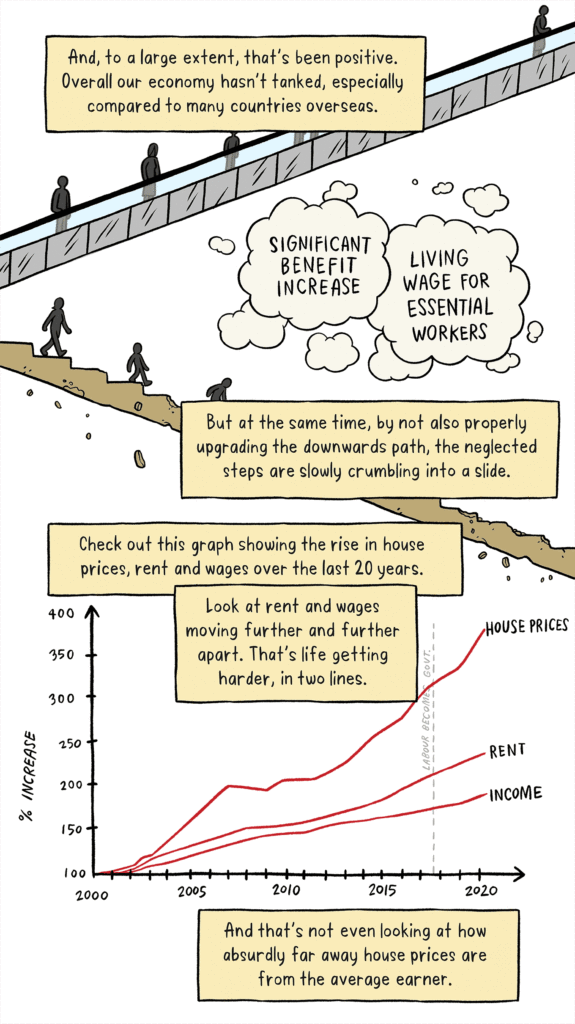I have long advocated that political parties should stop beating each other up over housing and instead create a collaborative framework for them all to work within. It was therefore delightful to read the article Peter Beck sent to me recently where the Churchtimes in the UK reported on the Archbishop of Canterbury speaking about housing in the House of Lords.
Here is one part of the article which caught my eye:
“No one, not even Government, can solve this on their own. Historic failure under all parties shows that. The Church wants to partner with other institutions on the ground: faith groups, local government, charities, housing associations, developers and anyone else who wants to work with us.
“But to transform our housing landscape, there is a need for sacrifice, which will be required from all of us, whether we are individuals inclined to nimbyism, organisations and companies whose primary concern is profit, or governments whose priorities are influenced by short-term election cycles.
“The Commission calls for a long-term, non-partisan strategy to deal with the crisis. The mess we find ourselves in is not the fault of any one government of the Left or Right; it is more than 40 years in the making. Simply building more houses will not solve the problem. We cannot build them fast enough to make any meaningful impact on prices and, realistically, what government would intentionally reduce house prices and thus the housing wealth of a large part of the electorate? Even if they did, electoral cycles are not long enough to incentivise long-term strategic thinking.”
The Bishop of Newcastle is quoted as saying:
“Every child should find itself a member of a family housed with decency and dignity, so it may grow up as a member of that basic community in a happy fellowship unspoilt by underfeeding or overcrowding, by dirty and drab surroundings.” https://www.churchtimes.co.uk/articles/2021/26-march/news/uk/put-aside-party-differences-to-create-affordable-housing-welby-tells-politicians

Here’s what the Archbishop of Canterbury is advocating in a graphic which was printed recently in the Economist. It requires all of us to stand side by side:
How often do we witness that when a Government announcement is made there is more heat than light as media tracks down every winger they can find and stuffs a microphone up their nose.
I know that Josephine and her partner can’t see any chance of owning their own house but the problem has been structural for decades. The subdivision of land has been driven by private sector developers for decades. Many of them have land banked and released the land slowly thus pushing up the prices. The construction sector has not really invested in apprenticeships and everything has ended up a big mess. The banks are another issue.
To try to rectify the housing system muddle by just focusing on parts of it, e.g., finance, land, house prices, bright line test etc is an error. The role of the Government is to take a big picture approach and to take the country with them. This will involve them ensuring that the debate is not about whether Labour or National is correct, but about the well-being of the country. This issue is above being only about politics. The media play it as a black and white issue. Some get it right. Most are just as shallow as bird baths.
It’s time for a housing accord:
Later last year I wrote an open letter to the Prime Minister calling on her to rise above the political scrum and to call on the efforts of all New Zealanders to address housing, for all. That meant reaching across the parliamentary chamber and involving the other political parties in the solution, as well as all the players in the housing system.
The man who reads the PM’s mail wrote me a pleasant email demonstrating that he hadn’t really understood what I had proposed and referred my email on to the Minister of Housing to respond. Well, that was last year. I still haven’t heard from the Minister. I guess she just finds things like this tiresome.
It’s probably still possible to have a Housing Accord. The Prime Minister has demonstrated that she is more than capable of reaching out to all New Zealanders. She has amazing political capital and a Minister of Finance who seems way more flexible than her Minister of Housing and maybe between the two of them they could rise up and challenge us all to do our part.
Let us accept that the issue of housing transcends political terms and parties:

I was searching for an image which reflects just how big the Housing challenges for our society really are. The one I chose is a picture which captures the dilemma we find ourselves in is the one below. It is a picture of the vessel which has become stuck in the Suez Canal.
If we think of the vessel as the Housing challenges we now find ourselves in. The digger which is hopelessly trying to shift the vessel on its own could reflect the Government. The challenge is too large for one part of the system to do it on its own. If we are going to shift the massive social dilemma of housing for all we need more than one player to be leading it. We need all of us involved.
What good commentators saying:
After last week’s announcement of Housing Reforms there were not many columnists or commentators who reached beyond their narrow framework and looked at the system as a whole. Two who did think broadly were Shamubeel Eaqub and Bernard Hickey.
Here’s Bernard’s effort: https://thekaka.substack.com/p/heres-the-detail-in-the-housing-package.
In one of his columns, he wrote:
The Government’s housing package was impressive on the surface and in the short term, but lacked any strategic focus or accountability around affordability. It also left an effective Government-wide guarantee for a too-big-to-fail housing market firmly in place. Bankers are already talking about the Reserve Bank having to offset the impact by lowering interest rates and removing LVR controls again.
Just as the Key-led Government failed to deal with housing because its immediate political antennae stopped it from major changes to the way Government and Councils fund and organise themselves around housing infrastructure and building, the Ardern-led Government suffers the same malaise: great political antennae, but a redundant economic and social radar for complex issues coming over the horizon.
Then Shamubeel wrote:
These (reforms) allow the government to increase serviced land supply, discount sections for social and affordable housing, and clamp down on investors and push them towards new builds.
They are constructive and buy time before other workstreams which are the big fixes: RMA reform, infrastructure financing, and banking supervision.
These policies are a good tactical move, but the politics may not land well. The landed gentry will hate it; disenfranchised renters and aspiring homeowners won’t see cheaper houses soon enough.
New Zealand has a structural shortage of housing – we simply do not supply enough land, infrastructure and homes where we need them. This has been exacerbated by ever-increasing amounts of easy debt increasing prices, property investment-friendly tax settings, and a low productivity construction sector driving the cost of construction higher.
A new $3.9 billion infrastructure fund and $2b for Kāinga Ora to develop and sell sections are big deals. They could conceivably release 80,000 serviced sections over the next decade. This is a big deal – given the current shortfall of housing is between 60,000 and 90,000 dwelling by my estimates.
Kāinga Ora was previously required to sell land at market price, but can now discount for social returns. It can now sell sections at lower prices for social and affordable houses that are retained for that purpose (for an agreed minimum period).
Here’s his article, and, once again, I see the Community Housing sector having an opportunity to commence discussions with Kainga Ora about land deals. https://amp.rnz.co.nz/article/599f8855-8ac1-4abc-8470-727e908131d6.
Below is a wonderful Toby Morris cartoon about the “K” shaped recovery below. The key point is that the necessary changes to building more houses is a structural thing. Structural change takes time. If you consider that the house prices have been rising significantly since 2003 and are now out of control. The responsibility for this rests on both Labour and National. To blame just Labour is shallow analysis.

Concluding remarks:
National has a very good housing spokesperson, Nicola Willis. However, she is talking just like Phil Twyford did when he was in her position as opposition spokesperson on housing. Neither of their arguments helped. Phil was dumped into a political ditch as a victim of his own over promising. Nicola needs to be careful for what will happen to her when its her turn to become Housing Minister.
We have to rise above this tribal nonsense. We need a housing accord where we all work together to find solutions for the human right of having a house above our head. This needs the team of 5 million to be called on again.
My parents lived at a time of housing stability, because public policy was well thought through and both major parties bought into similar policies. Why can’t we get back to this place again and treat it as a human rights issue instead of a tribal number-boasting one?
Leave a Reply